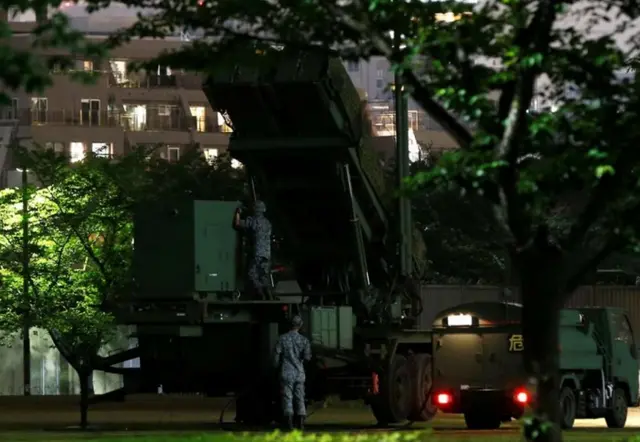Defence Minister Gen Nakatani ordered the Self-Defence Forces on Monday to prepare to intercept a possible North Korean missile, a government source said while South Korea also said it had detected evidence of launch preparations, officials from Japan and South Korea said.
Following the order, the SDF deployed the Patriot Advanced Capability-3 surface-to-air guided interceptors on the premises of the Defence Ministry in central Tokyo and step up surveillance activities, the source said.
The order comes after a separate government source said Monday there have been activities indicating Pyongyang is preparing a ballistic missile launch, possibly an intermediate-range Musudan missile, in the eastern part of North Korea facing the Sea of Japan.
South Korea’s Joint Chiefs of Staff also suggested on Monday evening there are indications that the North may launch a missile, saying it is closely tracking any missile-related signs and maintaining a high state of readiness.
“We’ve detected a sign and are tracking that. We are fully prepared,” said a South Korean official, who declined to be identified.
Tension in the region has been high since North Korea conducted its fourth nuclear test in January and followed that with a satellite launch and test launches of various missiles.
Japan ordered naval destroyers and anti-ballistic missile Patriot batteries to be ready to shoot down any projectile heading for Japan, Japan’s NHK state broadcaster said.
A Japanese official, who declined to be identified as he is not authorised to speak to the media, confirmed the order. A spokesmen for Japan’s defence ministry declined to comment.
North Korea completes work at shipyard dedicated to building ballistic missile subs
A Patriot missile battery on the grounds of Japan’s Ministry of Defence had its missile tubes elevated to a firing position.
South Korea’s Yonhap News Agency reported indications that a Musudan, a new type of ballistic missile with a range of 2,500-4,000km, was being mounted on a mobile launch pad near Wonsan on North Korea’s east coast, following three botched attempts since April 15.
Japan Self-Defence Forces soldiers are seen near a unit of Patriot Advanced Capability-3 (PAC-3) missiles (not in picture) at the Defence Ministry in Tokyo, Japan, May 30, 2016. Photo: Reuters
Japan had cancelled on May 11 a previous order issued in March because of no immediate danger of North Korean missile launches at that time.
Japan has put its anti-ballistic missile forces on alert at least twice this year after detecting signs of launches by North Korea.
North Korea’s latest mid-range ‘Musudan’ missile test fails seconds within launch
North Korea’s nuclear and missile tests this year triggered new UN sanctions but it seems determined to press ahead with its weapons programmes, despite the sanctions and the disapproval of its sole main ally, China.
Last Friday, leaders of the Group of Seven industrialised nations, including Japanese Prime Minister Shinzo Abe and US President Barack Obama, met in Japan and demanded that North Korea comply with a UN Security Council resolution to stop all nuclear and missile tests and refrain from provocative action.
On the same day, North Korea threatened to retaliate against South Korea after it fired what it said were warning shots when boats from the North crossed the disputed sea border off the west coast of the Korean peninsula.
Japan has advanced Aegis vessels in the Sea of Japan that are able to track multiple targets and are armed with SM-3 missiles designed to destroy incoming warheads in space before they re-enter the atmosphere and fall to there targets.
Patriot PAC-3 missile batteries, designed to hit warheads near the ground, are deployed around Tokyo and other sites as a second and final line of defence.
(RUETERS)
 简体中文
简体中文

